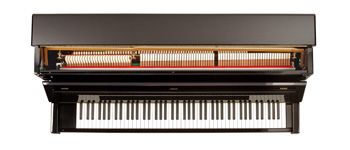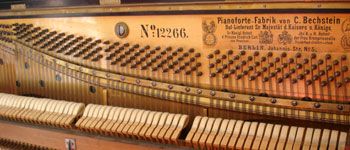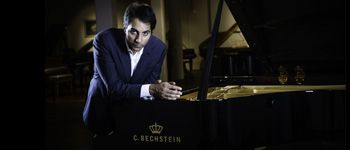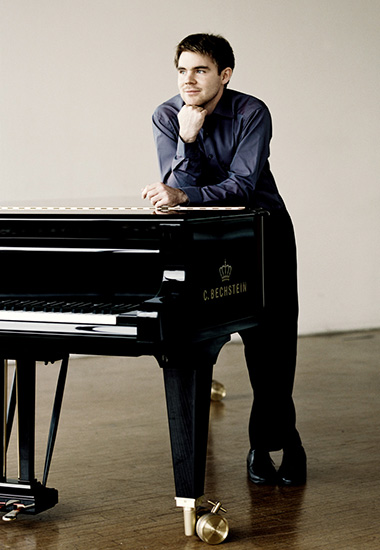„For me Bechstein with its inexhaustible richness and colorful sound is always a source of inspiration and joy.“
David Theodor Schmidt
Sueddeutsche Zeitung characterizes him as the "new heart-throb of all piano enthusiasts," Financial Times Germany calls his playing a "tonal experience;" - David Theodor Schmidt has something to say as pianist. Young pianist David Theodor Schmidt belongs to the musicians of the young generation, who already enjoy great recognition. In 2009 he was awarded the coveted Bayerische Kunstförderpreis sponsored by the Staatsministeriums für Wissenschaft, Forschung und Kunst. Born in Erlangen, David Theodor Schmidt studied in Karlsruhe with Sontraud Speidel and at the Royal College of Music Loondon with Keven Kenner. David Theodor Schmidt pursues a profuse concert schedule, which has led him to concerts in the most important halls, among which are Concert Hous Berlin, Gasteig in Munich, Concert House Dortmund, Gewandhaus Leipzig and the Tschaikowsky Conservatory in Moscow.
Along with radio and TV recordings, the young pianist's CDs published among others by Sony Classical and "Profil - Edition Guenter Haenssler" have aroused special attention. The magazine Fono Forum has distinguished his CD with compositions by Brahms, Mendelssohn and Schubert with the Star of the Month. Meanwhile he recorded two further discs with romantic repertoire on Bechstein - titled "Wohin?" and "Der Dichter spricht". David Theodor Schmidt: „For me Bechstein with its inexhaustible richness and colorful sound is always a source of inspiration and joy."
Fotos © Felix Broede, Gregor Willmes
David Theodor Schmidt plays Brahms, Mendelssohn and Schubert
![David Theodor Schmidt plays Brahms, Mendelssohn and Schubert]()
David Theodor Schmidt recorded 2008 on Bechstein his debut CD for Sony Classical, which did not go unnoticed by the reviewer of the Mannheimer Morgen: "Schmidt plays – incidentally on a well-voiced Bechstein - Schubert's late piano pieces (D 946) and Brahms’ Cycle Op 118 - all highly sophisticated and imaginative. What a pianist!” In FONO FORUM the CD was distinguished as "Recommendation of the Month." PIANO NEWS pronounced: "The fact that Schmidt plays on a Bechstein grand piano fits the image of a pianist who has grown up in the magic world of romance and very well knows how to conjure the sound of the past again."
Wohin?
![Wohin?]() Zum Promotion-Video der CD
Zum Promotion-Video der CD With his second Bechstein CD entitled Wohin?, David Theodor Schmidt sets off on a romantic journey. The young pianist recorded it in May 2011 in Berlin-Dahlem’s Jesus-Christus-Kirche – the church Herbert von Karajan frequently chose for his recordings – using a warmly, colourfully tuned C. Bechstein D 282 concert grand. The new CD includes five of Liszt’s transcriptions of Schubert songs: Wohin?, Der Lindenbaum, Ständchen, Der Müller und der Bach and Der Wanderer. Through its singing quality, expressive power and musical characterisation, this recording by Schmidt enthrals across the board.Schmidt also succeeds in rendering the emotional complexity of Kreisleriana, Op. 16 – a composition in eight movements by Robert Schumann. From gentle poetry to stormy rolls, the pianist conveys the mood changes of “Kapellmeister Johannes Kreisler” splendidly. The recording owes its transparent, warm tonality to sound engineer Holger Siedler. The CD appeared on the label Profil – Edition Günter Hänssler (PH11018).
The Poet Speaks
![The Poet Speaks]() Zum Promotion-Film der CD
Zum Promotion-Film der CD The new CD (Profil PH 12071) takes its title from The Poet Speaks, the last piece of Schumann’s Pieces of Childhood. And indeed, this recording shows Schmidt as a poet in two senses: first, because he has chosen works inspired by poetry (Franz Liszt’s Three sonnets of Petrarch, four Ballades by Johannes Brahms, Robert Schumann’s Sonata No. 2 in G Minor and last Piece of Childhood); and second, because the young musician plays these works so sensitively that he can be truly called a “poet of the piano”.
Unlike Schumann, who died in 1856, too early to enjoy the excellent grand pianos made by Carl Bechstein, Liszt and Brahms were great admirers of the German piano-maker who founded his business in Berlin in 1853. For his new CD — masterfully recorded by Holger Sieder in the Jesus-Christus-Kirche in Berlin-Dahlem — Schmidt chose a C. Bechstein D 232 concert grand, which was marvellously tuned by Torben Garlin. Thanks to such excellent recording conditions, the instrument is shown to its fullest advantage and the CD perfectly renders the Bechstein’s rich, clear and colourful voice. With this recording, David Theodor Schmidt demonstrates anew his ability to design wonderful singing lines, to lead us through the melancholic and contemplative universe of Romantic music, and to make his Bechstein sing, even in the most tumultuous phrases of Schumann’s sonatas. A masterpiece!
Theodor Schmidt and the art of transcription
![Theodor Schmidt and the art of transcription]()
For his fourth CD recorded on a C. Bechstein concert grand piano (Profil – Günter Hänssler PH14005), David Theodor Schmidt chose mainly transcriptions by Ferruccio Busoni of works by Johann Sebastian Bach and Johannes Brahms. While the Bach transcriptions are quite famous (Chaconne, Toccata, Adagio, Fugue BWV 564 and five choral preludes: Wachet auf, ruft uns die Stimme; Nun komm, der Heiden Heiland; Nun freut euch, lieben Christen gmein; Ich ruf zu Dir, Herr Jesu Christ; In Dir ist Freude), those of works by Brahms are true discoveries. As a result, Schmidt’s new CD is a jewel of piano music.
This recording is an homage to Busoni, who died ninety years ago on 27 July 1924. The fact that Schmidt chose a C. Bechstein concert grand piano is easy to understand, as the great Italian musician already had an instrument of this renowned brand in his Berlin music room. Brahms, who performed during the inaugural concert given at Berlin’s Bechstein Hall in 1892, also favoured Bechstein pianos.Unlike the many pianists with short-lived success that are constantly arriving on the music scene, David Theodor Schmidt pursues a quiet career and demonstrates his talent with every new recording. He excels in respecting the original while interpreting it with a personal touch. In the best German tradition of piano playing, Schmidt interprets transcriptions without trying to achieve virtuosity, but with much finesse, great sensibility and an analytical approach.It is interesting to note that Bach’s aria Schafe können sicher weiden, which Schmidt recorded on his new CD after a transcription by Egon Petri (a pupil of Busoni), also exists in a transcription by Dinu Lipatti that Luiza Borac recorded… also on a C. Bechstein grand piano!
David Theodor Schmidt recorded this CD in December 2013 on the C. Bechstein D 282 grand at the Berlin-Britz manor. Concert technician Torben Garlin prepared this wonderful instrument, while Holger Siedler was entrusted with sound engineering.Talking about this CD, Jürgen Seeger stated on BR Klassik: “It truly reveals a great, mature pianist who, without any swaggering, excels in getting all the depth and beauty from his instrument. Busoni’s transcriptions have found an ideal interpreter with David Theodor Schmidt."
Anlass des Busoni Schwerpunktes ist der 90. Jahrestag des Todes des Komponisten am 27. Juli 2014. Und dass Schmidt für die Aufnahme einen C. Bechstein Konzertflügel wählte, passt inhaltlich wieder bestens: Denn in Busonis Berliner Arbeitszimmer stand ebenfalls ein Bechstein-Flügel. Und der ebenfalls gewürdigte Johannes Brahms liebte ebenfalls den Bechstein-Klang und trat unter anderem 1892 bei den Eröffnungskonzerten des Bechstein-Saals in Berlin auf. Diese CD wurde eingespielt im Dezember 2013 auf dem C. Bechstein Konzertflügel D 282 im Kulturstall von Schloss Britz. Als Konzerttechniker betreute Torben Garlin das wunderbare Instrument. Für den hervorragenden Sound der Einspielung war erneut Holger Siedler verantwortlich. Jürgen Seeger urteilte über diese CD auf BR Klassik: "In Wirklichkeit aber erlebt man das ausgereifte Spiel eines großen Pianisten, der ohne jede auftrumpfende Geste die Klangmöglichkeiten eines Klaviers in voller Tiefe und Schönheit auszuloten und auszubreiten versteht. So finden Busonis ,Nachdichtungen' in David Theodor Schmidt einen idealen Interpreten."






























